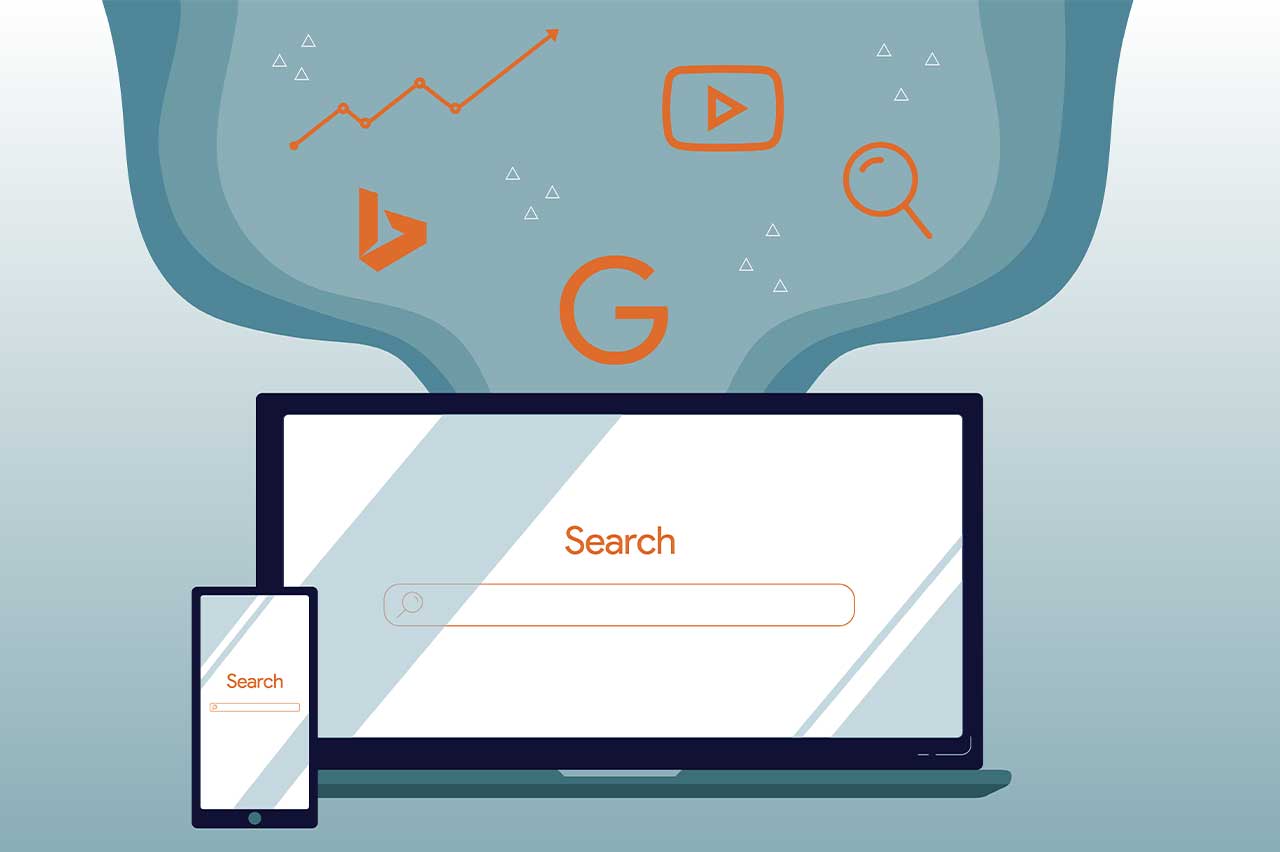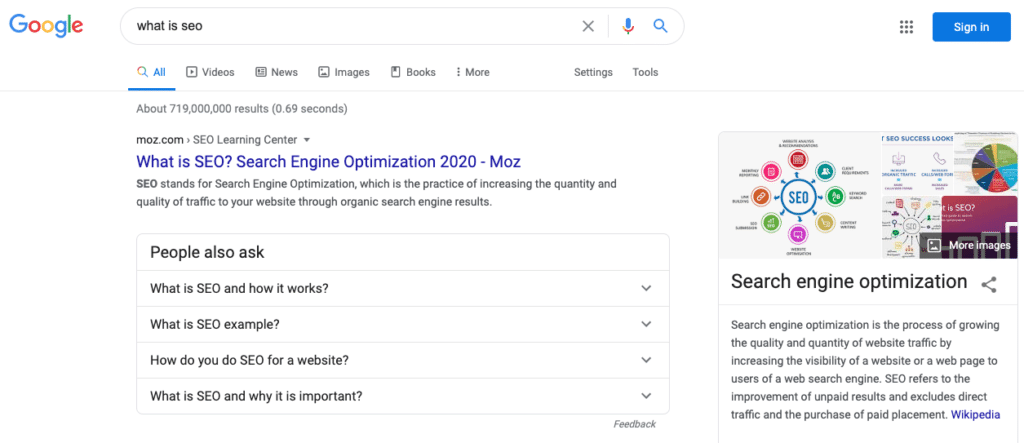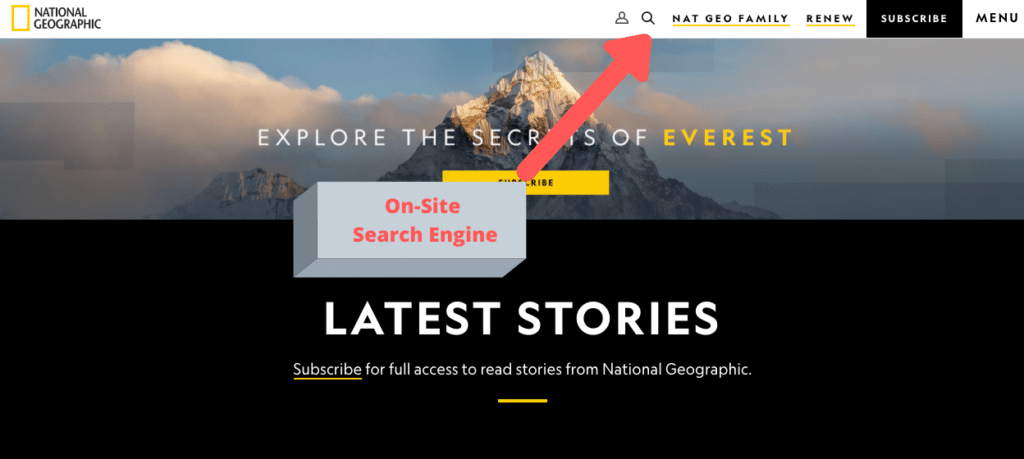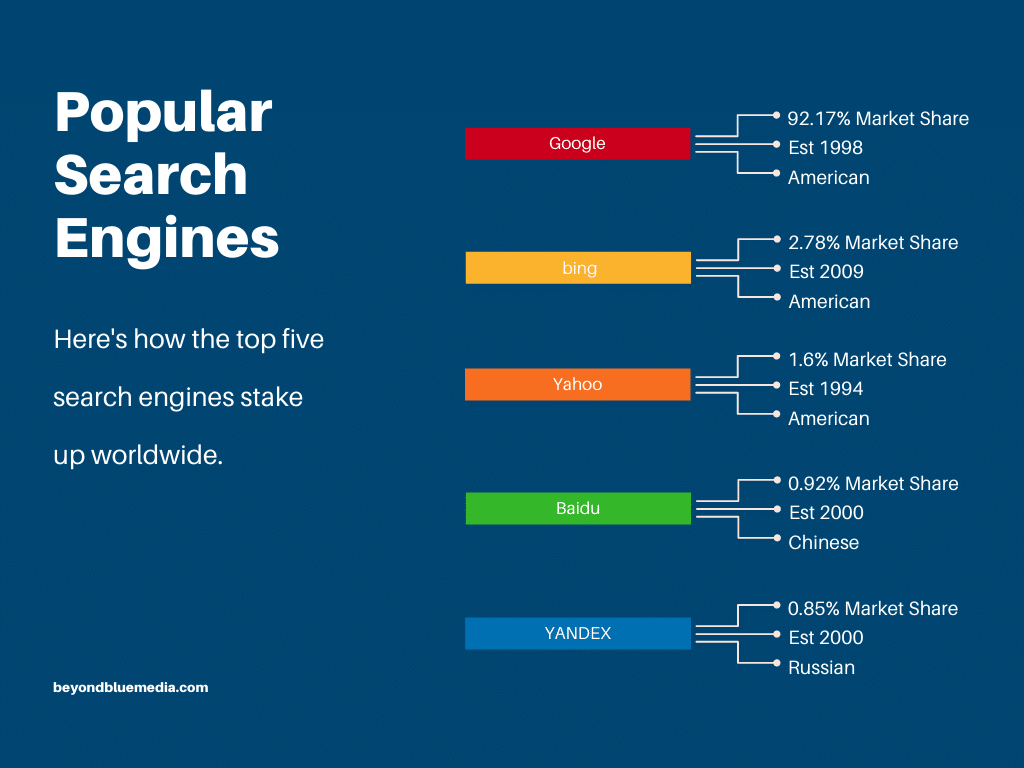
We use them almost every day.
They are a powerhouse tool to help users answer questions and easily connect with the boundless resources of the World Wide Web.
To understand its methods is to unlock an avenue to engage with potential audiences everywhere. In many ways, search engines knit together the entire internet.
Search Engine vs Web Browser
Before we dive into the meat of all things search engines, let’s clear up a common misconception.
Search engines and web browsers work in tandembut they are two completely different tools. A web browser is like a doorway into the internet. It is a software application that is capable of fetching data from servers worldwide.
Using a rendering engine, they translate Hypertext Markup Language (HTML) into the images and text you see on the internet. If you’re reading this, you’re likely on a web browser right now!
Some common browsers include Chrome, Firefox, and Safari. Once you step into one of these doorways, you have access to search engines.
Definition of “Search Engine”
In simple terms, a search engine is a web-based software that connects a user with an information database related to a given query or keyword. If a web browser is a doorway, a search engine is a roadmap you peruse to find relevant information.
Some of the more popular search engines include Google, Bing, Yahoo, and DuckDuckGo.

When you type a question or set of keywords into a search engine, results appear on a list referred to as the search engine results page or SERP. Several factors determine what you see on a SERP that we’ll dig into shortly.
The Different Types of Search Engines
Believe it or not, there are multiple types of search engines aside from the ones we use to crawl the internet in search of answers to our infinite questions.
Directories
This type of search engine relies on humans to index online content. That entails manually sifting through site descriptions submitted by site owners and either added to the appropriate category or rejected by the directory admin.
Some examples of a directory are Yelp or Yellow pages.
With the emergence of algorithms and crawling, these types of search engines are rendered obsolete today for most searches (more on this below).
Hybrids
Hybrids are powered by a combination of manual and crawler-based indexing. This is mostly used as a secondary method to filter out sites flagged as spam. But as crawling grows more advanced, even this hybrid-based indexing method is slowly being phased out.
A hybrid search engine many are familiar with is Google Maps. It allows for user editing and algorithmic updating.
Crawlers
So what is a crawler? The most commonly used search engine globally utilized on a daily basis is a crawler. This type of search engine relies on algorithmic software to search the web for content.
Bots or spiders ‘crawl’ through the internet in search of web pages, images, videos, and more digital content to index. They do the heavy lifting as far as categorizing and ranking for relevancy goes. Google Search is a crawler-based search engine.
We’ll further discuss crawlers and how they work soon.
On-site Search Engines
A final search engine to acknowledge is found within a website. On-site or internal search engines are used to navigate the content on an individual site. It usually appears as a magnifying glass at the top of the site.
Here’s an example from National Geographic:

This is an especially useful feature on blogs or e-Commerce sites that host many pages.
With a search engine plugin, a website visitor can type in a category or product and locate it with ease; all based on the keyword search connecting with page tags.
How Does Crawling Work?
If you want to understand modern search engines and how they function, it’s important to learn how crawling works.
Crawling-based search engines are powered by algorithms. Bots “crawl” through links to find new and updated URLs. The algorithm then determines what (and where) content should appear on the SERP.
This is called indexing. These results are ranked based on which content most efficiently resolves a given query search.
Indexing
There are several factors that bots consider when searching for relevant content to index. As they scan through a site, their ultimate goal is to find information that will best answer a user’s search query. Butthat’s only one piece of the puzzle.
A page is also indexed and subsequently ranked based on page load speed, usability, mobile optimization, and over 200 more search ranking signals just on Google. Once this data is collected, if deemed the ideal candidate for the search, a site is added to the index and will be visible on the SERP.
Presented and ranked search results are also based on the user intent of a keyword. If a search term is a question, local (i.e. food near me), or transactional (i.e. buy headphones), the results pages will look completely different.
NOTE: The SERP is flooded with billions of pages. Search results can offer millions of page results at a time, so a site doesn’t just rank for a keyword search on page 1 right off the bat.
With constant changes being made to search engine algorithms on a daily basis, ranking on the SERP is a moving target. Site owners must continually update their sites and other digital assets to remain relevant.
2ND NOTE: Pages can’t be indexed if they are marked noindex in your robots.txt file.
Importance of Links
Links serve as a sort of highway for bots to discover new content.
Internal links are crucial in indexing. An internal link is a link from one page of a site (example.com/home) to a different page (example.com/what-is-a-search-engine) hosted on the same site.
If a site doesn’t maintain a network of internal links, a bot will have a harder time crawling it. On top of this, pages that rank really well and connect to other internal pages improve website performance! Getting your internal link structure right is imperative.
Backlinksor inbound links are another way to gain credibility as a site. This type of hyperlink is directed to an external site. Crawling backlinks is a major way bots discover and rank content. If someone backlinks to your content, that signals authority and relevance to bots. But if a bot can’t reach a given page through internal links or backlinks, it’s as good as invisible from that source.
What Are the Top Search Engines Used Internationally?
As of 2020, these are the most popularly used search engines by users across the globe.

How Are Search Engines Helpful?
If the above-mentioned information isn’t enough to prove the worth of search engines, let’s break the manual process down for you.
You use a web browser to access the internet. You’re intent is to find something that is of use to you, typically something topical, right in the front of your mind. For example, you type in a search in the web browser’s URL address bar: how to treat swollen tongue.
Your results:
…
…
… nothing.
Why?
Because no search engine is in use to provide you with results!
Another scenario: You’re wanting to find a business’s website to order pizza. You type in: “dominospizza.com”.
Did anything happen? Probably not.
That’s because it’s not Dominos' direct website address, it’s another domain URL that could be used as a variant of the root domain if Dominos purchased it.
Search engines are so vital, even for the most infinitesimal things imaginable. They make our lives so much easier. And… they’re FREE!
With smartphones in hand and smart personal assistants like Google Home growing increasingly commonplace, we’re more plugged in than ever before. The internet has an answer for just about any query.
Consider search engines as a port of entry for all of that information. They are constantly improving their algorithms and making it easier to find relevant resources.
Search Engines Are Possible to Work With
Search engine optimizationor SEO is the process of following search engine best practices to play at a competitive level in the SERPs. The goal of SEO is to rank digital assets higher on the SERPs.
In order to achieve this, site owners will increase the quality of their content, make it easier for bots to crawl, index, and deem it relevant for search queries, all with the attempt to reach more of the owner’s audience, organically.
There are many ways to implement SEO on your website ranging from basic to advanced strategies. Here are some of the basic techniques:
- Create content that will be beneficial to your audience.
- Optimize photos and graphics to reduce page load time.
- Get links from sites with relevant content.
- Create content other sites will feel is relevant to link back to.
- Be sure your URLs are meaningful and easy for bots to categorize.
- Index all of your most relevant pages on Google.
These are just a handful of ways to optimize a website. And as search engine algorithms change, so does SEO. It’s important to not only optimize your website when it’s first published but to continually upkeep it to stay present with the latest techniques.
We guarantee that your competitors have a strategy to stay ahead on search engines.
Rank Higher on Search Engines
Are you a business owner trying to get a handle on SEO and rank on Google? Beyond Blue Media is here to help! We provide services such as technical SEO, consulting, area targeting, and more! Connect with us today to see what we can offer you and your business!


